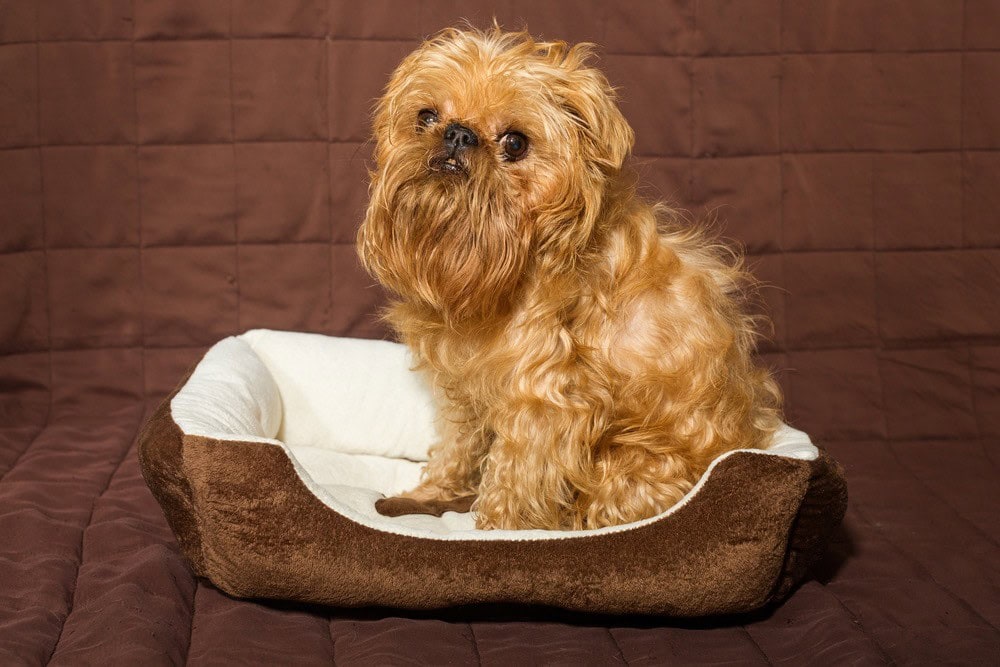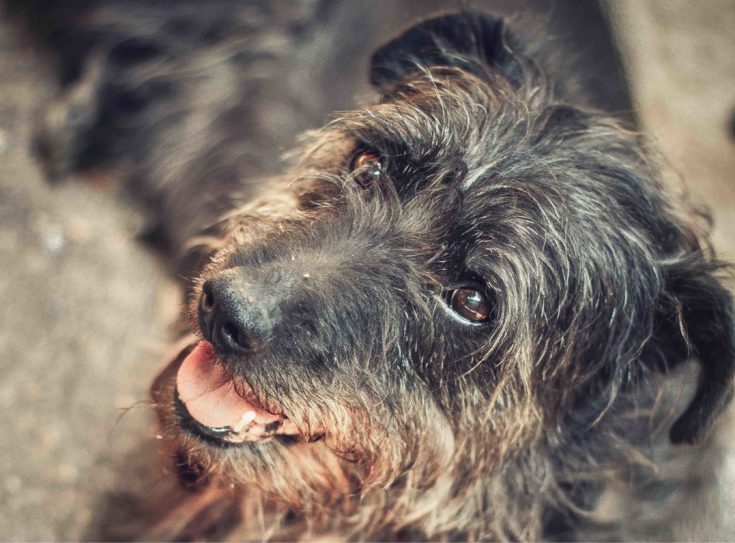Chow Hound | Dog Breed Info: Pictures, Personality & Facts

Updated on

| Height: | 13 – 20 inches |
| Weight: | 40 – 55 pounds |
| Lifespan: | 12 – 15 years |
| Colors: | Fawn, red, cream, brown, and brindle |
| Suitable for: | Active families with previous experience of owning dogs |
| Temperament: | Smart and friendly, can have protective tendencies, alert and can be loud |
If you’re looking for an active and outgoing medium-sized hybrid dog breed, then the Chow Hound could be your perfect companion. This designer breed is created by crossing the Chow Chow and the Basset Hound. The resulting puppies are smart and affectionate but can be challenging in terms of training and their potential to inherit the Chow Chow’s protective nature.
A Chow Hound probably isn’t the best choice for a first-time dog owner, as they’ll benefit from an experienced owner used to employing a range of different training methods to get the best from their dogs.
As a new designer breed, you might not know much about the Chow Hound, so if you’re ready to find out whether this charismatic pup could be the perfect breed for you, then you’re in the right place! Our guide will give you all the details about this little dog with a big personality.
Chow Hound Puppies
All puppies are adorable, and Chow Hound pups are no exception. But before you sign up for a new puppy, make sure you’re ready to make that commitment. Depending on what sort of temperament and personality your Chow Hound inherits from their parents, these puppies can grow up to be opinionated and protective. This can prove too much for inexperienced owners, leading them to realize that they can’t provide what this breed needs.
These pups also need quite a bit of exercise to keep them feeling happy and well adjusted. They can be prone to barking, and although this can be reduced with effective training, it can get out of control if not addressed while your puppy is still young.
3 Little-Known Facts About the Chow Hound
1. The Chow Hound is a recognized breed.
They might not be that well known, but the Chow Hound breed is recognized by the International Designer Canine Registry and the Designer Breed Registry.
2. You never know what you’re going to get.
As with any hybrid breed, the puppy’s personalities, temperaments, and appearance can vary depending on what characteristics they inherit from which parent. For any characteristics that both parent breeds share, there’s a high chance that the pups will also share that trait.
When the parent breeds have different characteristics, it’s harder to predict what your pup will inherit. In the case of the Chow Hound, Basset Hounds are laidback around children and other pets, but the Chow Chow can be possessive, even aggressive at times. So, it’s important to know that your pup could inherit this kind of temperament or end up with a total mix!
3. Training comes first.
Chow Hounds need an owner experienced at training dogs, as they aren’t the easiest breed to train. They can be stubborn and don’t have much recall like their Basset Hound parent, or they can be opinionated and possessive like their Chow Hound parent. Consistent training from as young as possible is key in helping these pups live well-rounded lives as a member of your household.

Temperament & Intelligence of the Chow Hound🧠
The Chow Hound is a smart pup, but they’re also independent minded. If your training isn’t engaging enough to keep their interest or they smell something that they want to investigate, they may just switch off and do their own thing.
They can be affectionate and loving with their owners, but if they inherit the nature of the Chow Chow, it can lead to possessiveness, even sometimes aggression if they haven’t been carefully trained.
Are These Dogs Good for Families?🏡
Chow Hounds can be good for families, but it depends on your family circumstances, your dog’s temperament, and how much training they end up having. Chow Hounds can be affectionate and loving, but they can also be possessive. Training will play a big part in helping your puppy get along with different family members, as well as visitors.
This breed can play well with older children who know how to interact safely with dogs, but they should always be supervised.
Does This Breed Get Along With Other Pets?🐶 😽
They can get along with other pets, and the younger your puppy is when they’re introduced, the better chance they have of getting along with other animals. Training may be needed to reduce any food aggression or possessiveness that your Chow Hound may demonstrate.
Some Chow Hounds do enjoy chasing smaller animals, including cats and local wildlife. So, careful introduction and a secure backyard are required to make sure everyone can get along.
Things to Know When Owning a Chow Hound
Deciding to become the owner of a Chow Hound isn’t a decision that you should make on the spur of the moment. While these pups can be a wonderful addition to your family, you also need to be prepared for the time and money that you’ll have to invest in them.
Food & Diet Requirements🦴
As a relatively active breed, Chow Hounds will thrive on a high-protein diet designed for medium-sized breeds. You can choose whether you want to feed dry food or kibble, but you can also be led by your dog’s preferences.
Your veterinarian can always help devise a suitable nutritional plan for your pup. Chow Hounds do love their food, so be careful not to feed them too much, as they can easily become overweight. If you use treats during training sessions, remember that these are part of their daily food rations!
Exercise🐕
Chow Hounds are moderately active, so you should expect to spend around 60 to 90 minutes per day keeping them physically and mentally exercised. A combination of walks and training sessions will keep your pup happy and content.
Bear in mind that Chow Hounds can inherit the strong scenting instinct of their Basset Hound parent. If they find an interesting smell, they will follow it without any regard to their owner. That means it’s always safest to exercise your pup on a leash when in open areas. They can be quite talented escape artists, so you might also need to make sure your backyard is secure enough to keep a determined Chow Hound within its fences!
Training🦮
Chow Hounds can be challenging to train due to their independent spirits. Chow Chows can be protective of their families but detached when it comes to training. If your Chow Hound inherits this trait, then you’ll need the help of an experienced trainer to help you work out the best way to train your pup.
Signing up for puppy classes is essential with this breed, so you can work out which methods are going to be most effective with your strong-willed pup.
Grooming ✂️
The amount of grooming that your Chow Hound will need depends on the type of coat that they inherit from their parents. Basset Hounds have an easy-to-care-for coat that only requires a weekly brush, while Chow Chows have a much thicker double coat that will need at least bi-weekly to daily brushing. Your pup may also end up with a coat in the middle of these two options!
If your pup has floppy ears like their Basset Hound parent, then keep a close eye that they don’t develop ear infections. It’s also a good idea to check your dog’s nails and teeth weekly.
Health and Conditions❤️
There isn’t a great deal of detail on the specific health conditions that can affect the Chow Hound, as they’re such a recent addition to the hybrid dog breed world. So, it’s best to look to the parent breeds for clues as to what could affect your pup. The list of conditions that can affect Basset Hounds and Chow Chows is extensive, but remember that most of these conditions may not occur in your cross-breed puppy.
Your puppy’s breeder will be able to give you detailed information about any of the conditions we’ve listed below, as well as details of the health checks that both parent dogs have had.
- Color dilution alopecia
- Ataxia
- Glaucoma
- Elbow dysplasia
- Hip dysplasia
- Wobbler’s syndrome
- Platelet dysfunction
- Intervertebral disc disorder
- Entropion
- Cataracts
- Progressive retinal atrophy
- Dermatomyositis
Male vs. Female
If you’re captivated by the idea of adding a sweet and sassy Chow Hound to your family, you might already be voting on the sex of the dog you want. We highly recommend waiting to make this decision until you’ve met the litter of puppies that you’re interested in! Your dog’s temperament and personality won’t rely on their sex, so choose the pup that you bond with the most.
You also might have to put your name down on a waiting list for available pups, and sometimes it won’t be possible to specify your preference.
Final Thoughts
The Chow Hound is a designer breed that has yet to become as well-known as some other breeds, like the Miniature Aussiedoodle.
They have plenty going for them, though, thanks to their smart and affectionate natures. They can be a little tricky to train, so make sure you’re either an experienced dog owner or sign up for classes to get you started.
Socialization is vital with this breed, but once you learn the tricks of how to get a Chow Hound’s attention, you’ll have a devoted partner for life.
See also:
Featured image credit: Nick Chase 68, Shutterstock












